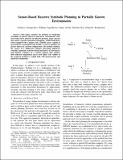Sensor-based reactive symbolic planning in partially known environments
Author(s)
Vasilopoulos, Vasileios; Vega-Brown, William R; Arslan, Omur; Roy, Nicholas; Koditschek, Daniel E.
DownloadAccepted version (1.979Mb)
Terms of use
Metadata
Show full item recordAbstract
This paper considers the problem of completing assemblies of passive objects in nonconvex environments, cluttered with convex obstacles of unknown position, shape and size that satisfy a specific separation assumption. A differential drive robot equipped with a gripper and a LIDAR sensor, capable of perceiving its environment only locally, is used to position the passive objects in a desired configuration. The method combines the virtues of a deliberative planner generating high-level, symbolic commands, with the formal guarantees of convergence and obstacle avoidance of a reactive planner that requires little onboard computation and is used online. The validity of the proposed method is verified both with formal proofs and numerical simulations.
Date issued
2018Department
Massachusetts Institute of Technology. Computer Science and Artificial Intelligence LaboratoryJournal
IEEE International Conference on Robotics and Automation 2018 (ICRA 2018)
Publisher
Institute of Electrical and Electronics Engineers (IEEE)
Citation
Vasilopoulos, Vasileios, et al., "Sensor-based reactive symbolic planning in partially known environments." 2018 IEEE International Conference on Robotics and Automation (ICRA 2018), Brisbane, Australia, 2018 (Piscataway, N.J.: IEEE, 2018): p. 5683-90 doi 10.1109/ICRA.2018.8460861
Version: Author's final manuscript
ISSN
2577-087X